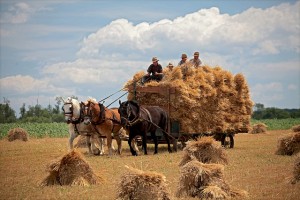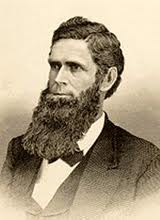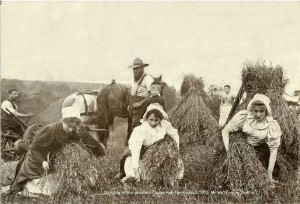♫Bringing in the Sheaves, Bringing in the Sheaves♫

Mom thought we were going fishing. But wait’ll she sees these sheaves we caught. Sheaves! It’s what’s for dinner.
This Protestant hymn begs the question: What exactly is a sheave and why does it need to be brought in?
Well to answer that question, you’ve first got to listen to the song and then you should read the story. Here is the audio: Bringing in the Sheaves (Disco Version). Pay particular attention (if you can withstand it) to the chorus beginning at the 30 second mark.
I’ll assume you’ve just endured it, I mean listened to it. Are you still conscious? You surprise me then. Let me begin by defining some terms:
Sheaves – Bundles in which cereal plants are bound after reaping.
Bringing in – Picking up something that was formerly out, and carrying it to a place that is now in.
The Story
Orbiting on the fringe of my awareness is a glut of unexamined peculiarities. These innocuous thoughts just quietly reside there, neither asking for attention nor being paid any. Occasionally though the orbit of one of these vague thoughts decays, and it comes streaking across my consciousness like a meteor, causing me to look up and consider its meaning. I like to think of these ideas as instruction sent directly from the heavens even though they’re usually ideas of little consequence; like how office chairs have 13 controls under the seat, but, besides the up and down lever, none of them seem to control anything. Or how when you pull a Kleenex out of a box of tissues, another one magically appears. If my life depended on it I couldn’t make that happen.
These kinds of thoughts momentarily pervade my consciousness and then recede just as quickly. Fortunately my human hard drive catalogues and permanently stores things that truly matter. Like when I hear that sharp beeping sound, I know something is backing up. That kind of information I keep close. Things that don’t matter, like tracking Kardashian marriages or knowing how Stella got her groove back, I allow to orbit peaceably on the fringes of my awareness.
Which brings me to a hauntingly sterile gospel song that once resided somewhere on the periphery of my event horizon until its orbit recently decayed and it streaked across my consciousness with an insistency I couldn’t deny. I’m referring to the hymn Bringing in the Sheaves. The lyrics were written in 1874 by Knowles Shaw, who was inspired by Psalm 126:6, “He that goeth forth and weepeth, bearing precious seed, shall doubtless come again with rejoicing, bringing his sheaves with him.” I’m not making this stuff up folks. I couldn’t be that funny – a songwriter inspired by a psalm about agriculture. Shaw may have had OCD when it came to the cultivation of large seed cereal grasses – but hey, these were the days before Adderall. Although rippling fields of wheat excited him, it is said amber waves of grain left him cold. Freud termed this phenomenon “Resurgent Diffluence.” Knowles wife simply called it an excuse to avoid intimacy.

George Minor. The Baptist Songster and stand-in when Sears and Roebuck needed a department store mannequin.
OK. So we’ve got the lyrics, What about the music?
We aren’t halfway done with the construction of this hymn celebrating the cultivation and harvesting of cereal grasses, because the lyrics just gloomily sat there – neither rippling nor waving. They needed to be put to some muscular music and it took the toe-tapping rhythm of George Minor to make Bringing in the Sheaves what it is today – something to be avoided at all costs. In 1880, when Minor wrote the music, he was still very much a Caucasian and despite once swaying his hips gently to Stephen Foster’s Oh! Susanna! he somehow managed to remain a honky the rest of his life. He displayed a vast musical repertoire ranging from solemn anthems all the way to depressing dirges and everything in between. Harper’s Weekly called him “Consistent, if nothing else.” While the New York City Police Department named him, “A person of interest.”
Minor, like Shaw before him, also derived great pleasure, perhaps too much pleasure, from transporting or “bringing” sheaves from one place to another. Usually from some place outside to some place “in.” As in bringing “in” the sheaves. In this way the drudgery of lugging bundles of sticks around on a muddy farm was somehow elevated to divine conveyance of our daily bread across a verdant meadow. It was the same act either way, but it was the attitude behind the act that made all the difference in coloring one’s experience.
Mr. Minor had a penchant for devotional music to such an extent he was nicknamed “The Baptist Songster” which in 1880 was like being known as LL Cool J. Minor said the entire score came to him in a fever dream he had while recovering from accidentally seeing his half-sister naked. Freud termed this disorder “Bushaphobia,” something many Democrats also suffer from. This is the very same George Minor who asked his half-sister Maybelle to the Autumn dance by declaring, “Dearest half-sister, perchance attend with me this twilight’s harvest frolic where we may gather sheaves aplenty.” To which Maybelle is reported to have responded, “No George. We have the same mother.” To which George retorted, “Well then, half-sister, what if I just took your top half to the dance….and brought your bottom half home with me? We shall come rejoicing. Oh will we come rejoicing…bringing in the sheaves of course.”
This grain fetish wasn’t just limited to Messrs.’ Minor and Shaw. Millions of rural serfs all over their rented lands thrilled to the communal joy of bundling up cereal grasses and dragging them to a great room for threshing. Celebrating their good fortune by saying, “No longer must we hunt and gather. Now we may proudly farm from the comfort of our sooty huts. Praise be to God for the nutritious endosperm we are about to receive in his blessed grains. For it is he who hath brought bushels of joy to the grist mill of life.”
Alright, I’ll Lighten Up
As a kid I’d occasionally hear snatches of Bringing in the Sheaves, or references to it. I didn’t know it was a gospel song then, I just knew it as the sleepiest, driest, most anti-musical song I’d ever heard. I could only wonder how it was committed to sheet music without someone euthanizing it beforehand. In some states the song was even used as punishment. In the early 1950’s Juvenile Court judges in Illinois were sentencing wayward teens to 30 days of listening to Bringing in the Sheaves; and then, if after those 30 days they still weren’t remorseful, they had to go to a farm and actually bring in sheaves for another 30 days. They were released early if at any time while bringing in the sheaves they spontaneously rejoiced.
Alright, I’ll Really Lighten Up Now
Truth be told, I laughed myself to sleep a couple of nights while focusing on the pious solemnity of such a mundane act – carrying bundled grass stalks from the field to the barn. And to think Bringing in the Sheaves was easily George Minor’s most popular song. This leads me to believe he wrote others that were even worse. Maybe I’ve got more research to do. I like laughing myself to sleep.
OK. I’m Light Enough.
I know. I know. Minor was born into a time when exuberance was expressed with great caution and Bringing in the Sheaves is certainly an improvement over Taking Out the Chamber Pots. This was a prudish time when seeing a woman’s ankle was known as “gettin’ some.” So we must acknowledge that the song was born of its time and give it a break. In today’s ironic culture, the song would be retitled Bringing in the Sheaf as I’m sure some wise ass would leave all his sheaves in the field and extract just one sheaf for bringing in. He might do that, but with only one sheaf, he wouldn’t rejoice very much.
I’m anxious to see what falls next from the heavens and streaks in front of my consciousness. Hmmmm. I wonder, how did Stella get her groove back?


